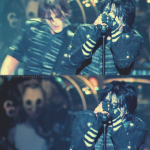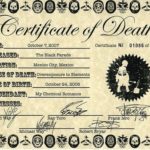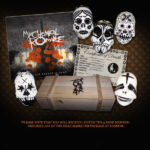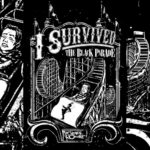Four years between albums is a lengthy wait for a rock band. What took so long for Danger Days to see the light of day?
I think the Black Parade tour went a little longer than it should have by about six months. We were beat, so we took a break for about a year, and started writing again February 2009. We had talked a lot about what the sound was going to be like, and in a way we created the sound of the record before we’d even picked up our instruments.
We were looking to do a more stripped-down version of the band—we had done that cover of [Bob Dylan’s] “Desolation Row” for the Watchmen soundtrack, and that was a much rawer sound than you’re used to hearing from My Chem. It was a response to the epic-ness of The Black Parade. The touring cycle was so hard for us physically and mentally, we saw that record and that sound as the enemy.
When we got close to the end of mixing, we realized we didn’t have a full album. So we got together with [producer] Rob Cavallo to record one or two more songs at the start of 2010, and when we recorded the song “Na Na Na,” it really opened things up for us. A lot of the flashes of creativity that you hear on Black Parade weren’t evident on [the discarded material.] We wrote a few more, and after about four songs we realized we were knee-deep in a new record, and that was Danger Days.
Commercially, The Black Parade was a massive success for My Chemical Romance, but in recent interviews, you guys talk about it as if you regret the whole thing ever happened. How did a platinum-selling album evolve into “the enemy?”
It’s a record I feel really proud of, and I don’t like to talk shit on it at all. I think the regrets come from the amount of touring we did and how we set up that record, taking on the persona of this imaginary band, The Black Parade. That persona was very antagonistic, [both] to the audience and to the press. It was a negative vibe, and that was the state of mind we lived in for two years. If anything, that’s where the regret comes from.
At its core, The Black Parade was an album about dying. How much of the negativity can be attributed to the subject matter?
You always have to listen to an album front to back to really get a sense of it, because the second half is where the ‘deep cuts’ are. With any record, most people only listen to the first four or five tracks. That’s true for a lot reviewers and listeners. Their idea of your music is [based on] the first four of five tracks and how you look in the videos. While The Black Parade dealt with death and [dark] subject matter, at the end of the record is the song “Famous Last Words,” which to me is the light at the end of the tunnel. The song’s message is very celebratory: “Get out and live your life.” The record plays out the way it does because it’s a journey. And not a lot of people want to take that roller-coaster ride, they only have 15 minutes to spend on a record.
Were you shocked with reaction of the British music press to The Black Parade?
We were paying a lot of attention to the press—it’s really hard not to. And they skewed very negative. We were being labeled as some kind of death cult. It was [being said] we were leading some sort of suicide revolution. And all this bullshit really weighed on us. It took its toll on the band. They didn’t get it. A lot of them deal in tabloid-ism and sensationalism. Papers like The Daily Mail, they’re not listening to the record, they’re going online and reading what other people are saying, and then it’s filtered down until they come up with their story.
We toured throughout Australia and Mexico, and we felt like we had targets on us. We were always going out there to prove something. That was the energy surrounding the touring of that record. We regret that all that stuff happened. There’s no regret about the music.
“The Black Parade thanks you for all of your gifts! Including the socks!”
– 2/28/07, Detroit
“I’m sure you all have seen in the tabloids calling us some emo death cult. But I’m sure you know that we have never encouraged you to be anything than your fucking selves, and to never take any one else’s mother-fucking shit!”
– 2/28/07, Detroit
“The Black Parade is DEAD!”
– 3/13/07, San Diego, CA
“The Black Parade went home… back to Italy!”
– 3/15/2007 Oakland, CA
“Although technically, the Black Parade, are from ITALY.”
– Manchester 3/24/07
“We are Le Black Parade. Let me hear you say it. (fans say it). Le Black Parade – it’s French. Get with it. It’s new. It’s fashionable. Get with it – It’s French.”
– Tampa 4/19/07
“The Black Parade has to go home soon, so you’re gonna be stuck with My Chemical Romance. I’m sorry. That singer has a despicable mouth, he dresses funny, and he can’t sing!”
– Ft. Lauderdale, FL 4/22/07
“Okay, we’re gonna play two more songs for you, then the Black Parade is going to get in their black sedan…and go home. Back to Italy. My Chemical Romance is coming on after this. But personally I think their music isn’t that great and they have horrible taste in clothing.”
– Atlanta, GA 4/24/07
“The Black Parade’s only got two songs left, but next up is My Chemical Romance. If you’re asking me, which you aren’t, but anyhow, I think they’re horrible dressers. And their language is atrocious.”
– Columbia, MD 4/27/07
“My Chemical Romance are from New Jersey, Thursday are from New Jersey, but the Black Parade are from Italy. Just so you know.”
“We are the Black Parade! Coming up next is My Chemical Romance…if you’re into that kinda shit!”
– show in Hartford CT 2007
This Is How The Story Ends.: My Chemical Romance and the Death of Emo – MSN Interview
The article began its incendiary report rather matter-of-factly: “A girl of 13 killed herself after becoming obsessed with a fashion which links death with glamour, an inquest heard. Hannah Bond hanged herself from her bunk bed with a tie after becoming an ‘Emo.’”
The date was May 9, 2008 and the British paper the “Daily Mail” was reporting on the sudden suicide of a teenage girl after her parents wouldn’t let her sleep over at a friend’s house. Though her musical tastes were certainly put into question by the coroner, with its next sentence the paper would set off a firestorm of controversy and anger whose ripples can still be felt today: “Emo fans wear dark clothes,” it read. “Practise self-harm and listen to ‘suicide cult’ rock bands.”
And there it was, an assumption by a journalist aiming to drum up publicity with little to no proof. The article went on to name only one band in its attack on ‘Emo.’
“One of the foremost of these “suicide cult” bands is My Chemical Romance, from New Jersey,” the last paragraph begins before describing the success the band’s concept album, ‘The Black Parade,’ had attained in the UK. It concludes with a final, ignorant interpretation of the concept: “The Black Parade is a nickname for the place where Emo fans believe they will go when they die.”
With that the members of My Chemical Romance — a band at the height of their fame whose message, especially on that album, their biggest commercial success to date, was of positivity in the face of death — affectively became the target for thousands of frustrated mothers looking for someone or something to blame. The fallout was epic.
“I thought if we made an album that tried to change the world, or give it hope, it would really happen,” lead singer Gerard Way recently told Spin Magazine. “But all people found was death and destruction and misery and self-hate. I learned the world doesn’t want to be saved, and it will f—cking punch you in the face if you try.”
It was with this mentality — emotionally broken, artistically strained — and at the height of their popularity, that the band began getting work on a follow up. With its lead singer and songwriter’s guilt weighing heavily on its shoulders, My Chemical Romance set out to create “the polar opposite of the Black Parade” and, in turn, release itself from the dreaded tag that hung like a noose tightly around their necks.
Speaking with Exclaim!, My Chemical Romance frontman Gerard Way discussed what led to scrapping a full two albums’ worth of material.
“I think the first attempt at this record was a reaction to the ambition of [2006’s Black Parade], unfortunately,” Way says. “And, I guess, thinking if we kill the ambition, strip it down, cut our hair and present ourselves as respectable and make a very safe rock record that will avoid for us any hardships, potentially, and we won’t rock the boat or make so much noise. Which means we could keep doing what we like: make music together. But Danger Days ended up being a rebellion against that rebellion, like saying, ‘We have to do this again if we really believe in this and each other.’
"It was definitely a reaction to the toll it took, but we took it and turned it into something really positive. If it took a heavy toll on us again, we’d say, ‘Okay, it’s taking a heavy toll on us so let’s go on a really fun, bright, colourful dance party adventure, so then we get to live that every night. We don’t have to live something so dark.’”





